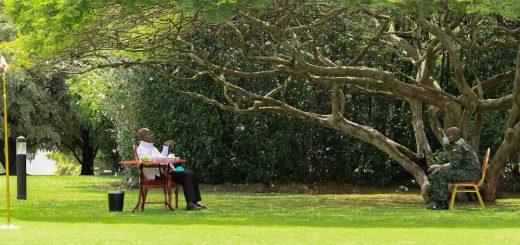Strengthening the separation of power in Uganda. Preventing MPs from serving in the executive will strengthen the Independence of the parliament of Uganda

Separation of powers is a legal principle that divides the state into three branches and assigns each organ of the state different but complementary powers. It dictates the fundamental balances of power between the three branches of the Government. The seperation of power is necessary to ensure that one branch of the government doesn’t overpower the others and become dictatorial or oppressive. The idea is that each branch of government has its own separate roles and areas of authority independent of each other. The seperation of power was coined by French jurist, Montesquieu in 1748. He proposed the theory that ‘there can be no liberty’ without sufficient checks and balances against the power of the Government. He explained that “everything would come to an end if the legislative, executive and judicial powers of government were to be exercised by the same person or authority” (L’Esprit des Louis 1748)
Montesquieu was right in 1748, he has continuously been proven right more than two hundred years later and will continue to be right to the end of time. When power is concetrated in the hands of one person, the corrupting influence of power leads that person to abuse it because there is no one to act as a check against abuses of the power. Such a person is the law itsself with the power to do anything he or she pleases. Such a person can levy taxes, collect the taxes, spend the revenue, declare war, end war and do anything imaginable without the need to consult or answer to any one. The nearest example of such a person is God himself and the days of God’s anger teach us one thing, we are alive because of his mercy. The other closest comparison to such a person is man in the state of nature whereby he was his own judiciary, legislature and executive. However, the fact that man’s life in the state of nature was short, chaotic, cruel, brutal and archaic should show us the magnitude of the calamity that can arise from the fusion of the executive, judiciary and legislature. In the two last centuries, states that were unlucky enough to experience the fusion of the branches of the state such as Cuba, Zimbabwe, North Korea, Germany, Italy and many others are the cautionary tale of how right Montesquieu was in 1748. The ground in those countries and others that have gone through such brutal dictatorship is soaking with the blood of the innocent.
In the most basic application of the seperation of power it might require that executive, legislative and judicial power to be vested in different individuals to prevent the risk of fusion of the powers and thus undermine the seperation of power. Bradley Ewing (2007) argues that the separation of powers may require, depending on interpretation, that the holders of the three powers must be separate or distinct individuals; that one of the three powers does not control the work of another; or that one organ of government should not exercise the powers of another. However, he concedes that keeping all three roles completely separate is both theoretically and practically impossible.
Actually in the United Kingdom and and other common law countries there is considerable overlap between the legislature and the executive and some overlap between the judiciary and the executive in terms of personnel. In Uganda the overlap between the judiciary and the executive in terms of personell has been held to be unconstitutional because it infringes on the seperation of power and the Independence of the judiciary. In Jim Muhwezi & 3 Others V. Attorney General & Anor Constitutional Petition No. 10 of 2008, the Constitutional Court held that it was unconstitutional for judges to serve in the executive branch without first resigning from the judiciary. According to court, “In our judgment the functions and powers of the IGG are incompatible with those of a judicial officer and it was a gross violation of the provisions of the Constitution separation of powers and the independence of the judiciary“. This was affirmed again by the same court in Bob Kasango v Attorney General and Anor (Constitutional Petition-2016/16). However, the Judiciary Act of 2019 attempted to reverse this outcome by allowing judges to be appointed on special assignment to the executive without first resigning. It should be noted that it is doubtful that Parliament has the power to reverse a Constitutional interpretation by a court of competent jurisdiction without a Constitutional amendment since the Judiciary is the final arbiter or the law.
In the United Kingdom the overlap between the executive and parliament has been criticized by scholars and sections of the government itself . For example, In 1978, a Select Committee report suggested that the balance of advantage between Parliament and Government is so weighted in favour of Government that it is inimical to the proper working of our parliamentary democracy. The fusion of the executive and parliament threatens the rule of law by eroding the independence of parliament. It make parliament a rubber stamp of executive decisions rather making independent legislative decisions in line with the mandate given to it by the electorate. The fusion between of the executive and parliament is dangerous because already in many cases the political party or parties in control of the executive often have the majority or even a super majority in parliament enabling them to pass any laws they want. When there is overlap in the personell of the two organs of Government, it erodes the check and balance between the two organs even further. For example in Uganda, legislation is originated and drafted by the executive branch rather than being drafted by parliament itsself. Parliament ordinary adopts most legislation as drafted by the executive. In the circumstances, the executive is in reality dictating the contents of legislation. The executive is in fact legislating thus violating the seperation of power between the two organs of the state. Furthermore, in Uganda, members of parliament serve as ministers in Government which further erodes the independence of parliament and violates the prohibition against holding two public offices and the seperation of power between the legislature and the executive. The same people who legislate are the same people making executive decisions as part of the executive.
Another way in which Parliament breaches the seperation of power is through delegating its power to the executive. Though Government would not function properly without some delegation of rule making power to the executive, parliament in many instances delegate broad legislative powers to the executive in violation of the seperation of power. Parliamentarians are elected Government officials who can be held accountable by the public at the polling station but executive employees who draft and enforce delegated legislation are not accountable to the people. Due to the seperation of power and the unaccountable nature of public officers, court have put in place a none delegation rule to prevent the delegation of broad legislative powers to the executive. However, court have criticized parliament for giving up too much of its powers to the executive. In Reade v Smith [1959] NZLR 996 Turner J states as follows:
“To anyone accustomed to the notion that the law-giving powers of the people are reposed by them in Parliament, it may come as a surprise to learn that since 1915 the Legislature appears to have surrendered these powers to the Executive as regards such matters as are covered by this section; and that not content with delegating its principal function to the Governor-General, it has purported to sign a blank cheque and to ratify in advance whatever he shall do by regulation, even if it is in conflict with the express provisions of the Education Act itself. In construing a section which at first sight may appear to carry self-abnegation so far, the Court will strive to give it a restricted interpretation, preferring to regard Parliament as not having made any more complete surrender of its powers than must necessarily follow from the plain words used.”
The non-delegation doctrine is a principle in administrative law that parliament cannot delegate its legislative powers to other entities. According to the Supreme Court in A.L.A. Schechter Poultry Corp. v. United States, 295 U.S. 495 (1935), Congress is not permitted to abdicate or to transfer to others the essential legislative functions with which it is thus vested.” The prohibition extends to parliament delegating its powers to administrative agencies or public officers or private organizations. The rule only allows parliament to delegate the power to clarify a broad mandate that parliament has already specifically provided for. For example parliament can impose a fee and leave it to the administrative agencies to set the quantum of the fee or parliament can impose an exception and allow the implementing agency to set the procedure for granting the exception. In J.W. Hampton v. United States, 276 U.S. 394 (1928), the Supreme Court clarified that when Congress does give an agency the ability to regulate, Congress must give the agencies an “intelligible principle” on which to base their regulations. However, this standard has been criticized as being quite lenient, and has rarely, if ever, been used to strike down legislation. For example in Her Majesty’s Treasury v Mohammed al-Ghabra. The treasury froze the money and all assets of three suspected terrorists who had not been officially tried or charged. The suspected terrorists appealed to the UK Supreme Court claiming the Treasury had gone beyond its powers as they did not have Parliamentary legislative approval to freeze suspected terrorists’ assets. The UKSC judgment upheld the appeal stating the treasury needed legislative approval through an act of parliament to be able to take such extreme measures. Therefore, unless a specific rule making power is delegated to the executive by parliament, actions that have a serious impact on the rights of individuals must be approved by Parliament. The executive can not undertak such consequential action by executive action alone. For example a rule without a mechanism to challenge it would be unlawful because there must come a point when the intrusion upon one’s rights is so great, so overwhelming and so timeless that the absence of any effective means of challenging it means that this can only be brought about under the express authority of Parliament
Both the executive and parliament have extensive powers and in the seperation of power they are supposed to act as a check on each other’s powers. The judiciary controls neither the armed forces nor the purse but parliament has the power of taxation and appropriation. On the other hand, the executive controls the armed forces and enforces the law. The two powerful branches of Government are supposed to act as a check and balance to each other to ensure that neither is too powerful so as to over ride individual Rights.
However, the fusion of the executive and parliament means that the executive power is unchecked and unlimited. Where parliament is subservient to the executive, the executive can engage in abuse of power without consequences. In such circumstances the chief executive is basically above the law because the body that is supposed to check and moderate the exercise of executive power is under the control and direction of the executive. So the executive can float and ignore court decisions without consequence. The executive can storm the high Court and arrest law abiding citizens that have been granted bail by a court of competent jurisdiction. The executive can kidnap, hold without trial and torture law abiding citizens with impunity. The executive can can storm the legislature in broad day light, beat and arrest members of parliament without consequences.
The powers of parliament to legislate and provide oversight to the executive is very broad. For example parliament has the power to amend the Constitution and the power to impeach and remove the president. Parliament has the power to levy taxes and appropriate the state revenue. In the United kingdom there is a principle of parliamentary sovereignty which means that the ultimate power of the state is vested in the members of parliament who legislate on behalf of the people. Even though the president has the power to veto laws made by Parliament, if a sufficient majority of parliament desires it, they can override the president and pass the law against the wishes of the president. Therefore, theoretically, there is parliamentary sovereignty in every Constitutional democracy because the power of parliament to legislate is very broad. The power is only limited by the Constitution as explained below:
Parliamentary sovereignty means that Parliament can, if it chooses, legislate contrary to fundamental principles of human rights. The Human Rights Act 1998 will not detract from this power. The constraints upon its exercise by Parliament are ultimately political, not legal. But the principle of legality means that Parliament must squarely confront what it is doing and accept the political cost. Fundamental rights cannot be overridden by general or ambiguous words. This is because there is too great a risk that the full implications of their unqualified meaning may have passed unnoticed in the democratic process. In the absence of express language or necessary implication to the contrary, the courts therefore presume that even the most general words were intended to be subject to the basic rights of the individual. In this way the courts of the United Kingdom, though acknowledging the sovereignty of Parliament, apply principles of constitutionality little different from those which exist in countries where the power of the legislature is expressly limited by a constitutional document.”Lord Hoffmann in Simms at p 131:
The above decision is from the United Kingdom which has no Constitution to constrain the power of parliament but in countries like Uganda and the United States, the Constitution places limits on the power of parliament such as individuals rights. These Constitutional limitations can only be overridden by Constitutional amendment. However, since the parliament of Uganda can amend the Constitution, then Lord Hoffmann is probably correct in suggesting that the only constraint on the power of parliament is the people.
When the representatives of the will of the people are bribed by awarding them executive positions, they becoming part of the very body they are supposed to provide oversight. In such circumstances, the seperation of power becomes meaningless and the victim is the citizens and the rule of law. If parliament is independent and proactive it will exercise it’s legislative and oversight functions very well. Even in powerful democracies such as the United States partisan polarisation is threatening the oversight and legislative function of parliament even though there is no fusion of the executive and parliament. This situation should teach young democracies like Uganda to preserve the Independence of parliament by ensuring that members of Parliament are not part of the executive.
Read More
- Ideal Amendments that should be included in the Magistrates Courts Amendment Bill 2026 of Uganda
- President Yoweri Kaguta Tibihaburwa Museveni is a minority President voted by only 7,946,772 (36.7%) out of 21,649,608 eligible Ugandan voters in the 2026 Presidential Elections
- Four years of IGG Beti Kamya drowned the Inspectorate of Government (IG) deeper into oblivion and irrelevancy but it Can be redeemed


